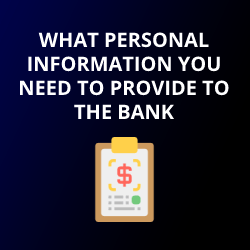Teenagers, youth, and adults know how important banking is.
Most people have to deal with their financial institution daily, no matter if they buy products, send money to their relatives, or pay for the WritingPaperSucks services.
Irrespective of the reason why you address the facility, you should be 100% sure it will help you deal with the issue and keep your funds safely stored and protected.
While in most instances, clients have no problems with the security of their finances, a lot of people complain about the protection and safety of the vulnerable information provided to the bank.
At this point, it is critical to acknowledge that sharing the private information of the users and passing it to a third party may decrease the reputation of the financial institution and reduce the level of its relevance on the market.
Consequently, the overwhelming majority of banks and credit groups make maximum effort to protect their clients from any type of violations that can lead to unwanted results.
Additionally, it is critical to acknowledge that financial institutions do everything possible to reduce the amount of information they collect.
Generally, if you are asked to provide some of your personal information, the first things that will come to your mind are the name, address, and phone number.
In fact, it is the simplest way for people to identify themselves and give a better understanding of their individuality.
According to Wikipedia, all these facts are indeed classified as personal information.
Nonetheless, this list can be extended, including some other aspects.
When it comes to the sensitive data about a person, it is critical to mention that name and the phone number are not the only aspects interesting for the banks and other facilities.
Apart from the standard set of data, they are likely to collect info about your location when you browse the website or accomplish certain transactions.
Additionally, they are likely to have your email address when you submit it in order to get regularly updated about new offers and discounts.
Therefore, it is indispensable for the client to be responsible and attentive filling in online forms and other types of papers, especially when it comes to the banking sphere.
It will help them prevent unwanted and unexpected situations, reducing the risk of the sensitive data to be stolen or sold.
Additionally, it is critical to highlight that trusted and reputable banks implement the most innovative types of encryption systems that guarantee the maximum safety and protection of all the data collected during the registration process.
The Information the Bank May Require
No matter if you apply for a credit card or you just strive to do a specific transaction in the bank, you will have to submit a form, including important personal information.
Nonetheless, apart from the data you include, the bank will collect some other facts, such as the date, time, and location of the purchase.
This way, the financial institution strives to advance the quality of provided services, supplying users with the most beneficial and advantageous services.
Putting all the information gained by the financial institution, you may get a pretty nice picture of the customer’s life, but you can be 100% sure that dealing with a trustworthy and appreciated bank, this data will never be passed to a third party.
Striving to eliminate possible risks and deal only with reliable platforms, you need to stay selective.
Double-check the terms and conditions sections of the bank before you open the account.
Make sure the most recent encryption system is used to keep your data safe and protected within the facility.
Provide the bank only with the information needed for the registration of the new account.
Do not insert too many details that may be unnecessary for the facility.
Aren’t you sure which data to mention?
Check out the list of the most commonly required documents for the creation and use of the bank account:
- A valid ID. Most banks accept both the driving license and the government-issued passport.
- Social security number. Additionally, the banks may require more detailed info about your birth date, taxpayer identification number, email address, and phone number.
- An initial deposit. It is not the obligatory point, but there are numerous banks that will ask for such information.
- Identification for other applicants. Opening a joint account, you will have to provide information about all the participants of the process.
- A co-owner. If the applicant is not 18 years old yet, his parents will have to sign the documents.
It is critical to remember that the information you will have to provide for the creation of the bank account may vary a lot depending on the financial institution you choose, as well as the purpose of the account creation.




cool